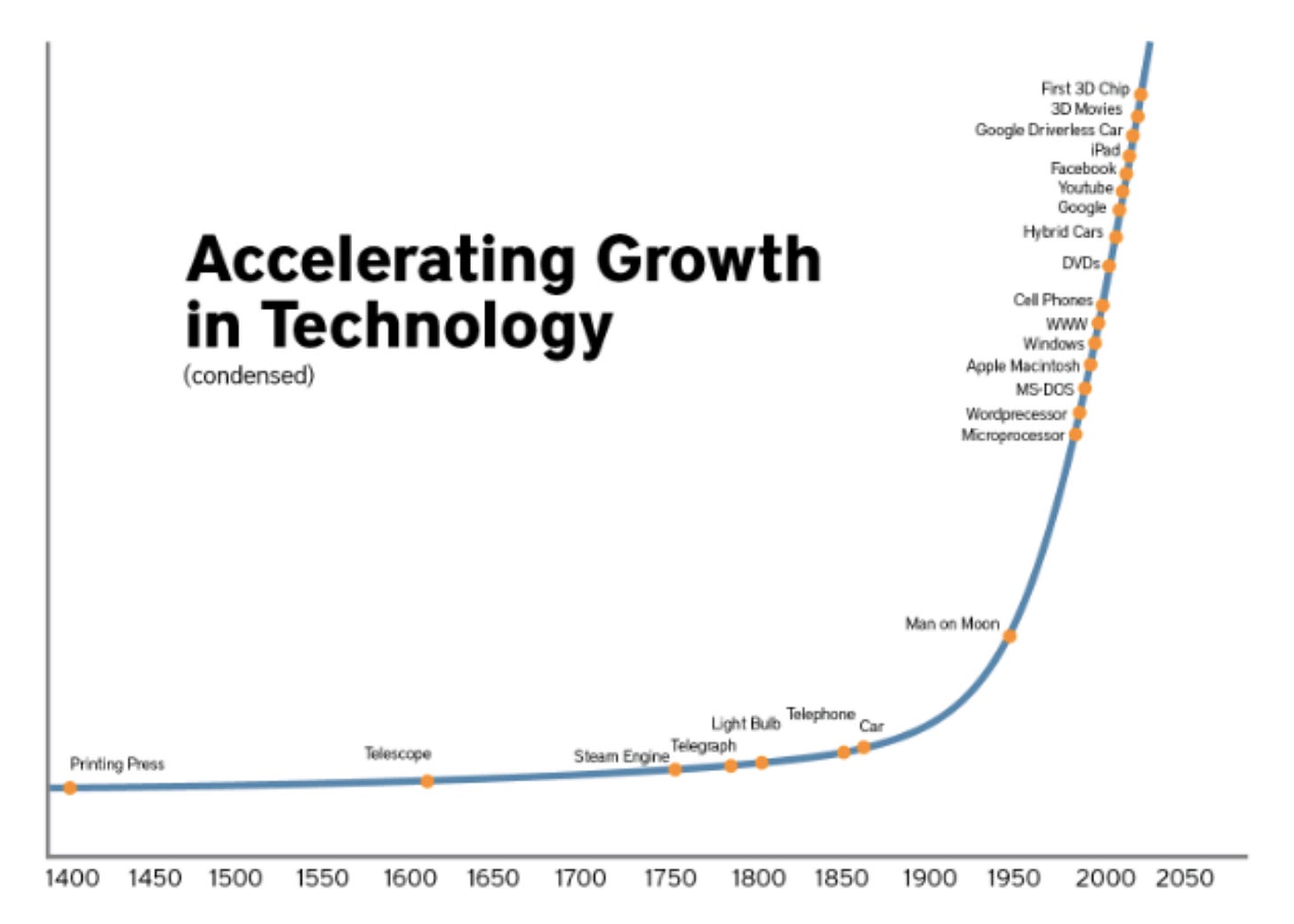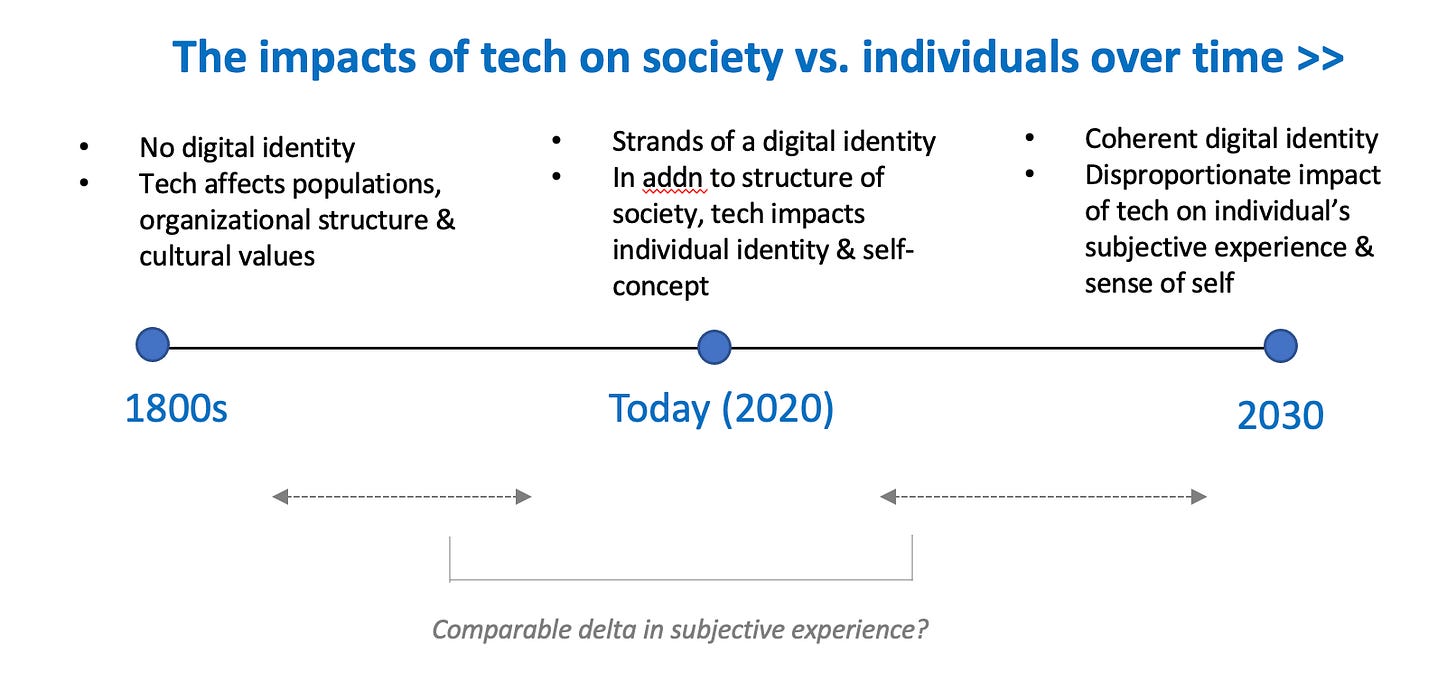Tech determinism is the idea that a society’s technology determines the development of its social systems & cultural values.
According to this theory, accelerated globalisation is inevitable because of the accessibility to and ubiquitousness of technology - innovation in tech is the dominant driver of social change.
Marx supported this: he believed that 1) tech is the primary influence on human social relations [& organisational structure], and 2) social and cultural relations revolve around the technological/economic base of society. That is, he believed that tech shapes structure of social relations.
This was in the 1800s - today we're in 2020*. If technological determinism was true in the 1800s, based on the law of accelerating returns, it must be exponentially true-er now.

Is tech determinism true though?
Yes - at least to a degree. That the development of new technology influences the structure of society (and has for the last 200+ years) seems like a fair assumption.
But interestingly, today this seems to be true at the level of the individual as well: we’re experiencing a shift to a form of technological determinism where technology disproportionally affects an individual’s relational identity & individual self-concept.

1800s - Enabling tech didn’t exist for a singular person's identity or experience to be uniquely shaped by a customised technological experience; no existence or conception of a digital identity.
Today - Digital identity is abstract, but can be tied to our social media accounts. It’s limited to text, pictures, videos of how we represent ourselves online. We have different apps to showcase various aspects of who we are (IG is reserved for curated aesthetics, appearances, and social signaling; twitter for building a portfolio of takes and high-frequency commentary, and LinkedIn for verifying the legitimacy of professional experiences), the composite of which make up our digital identity; an identity whose value is governed by arbitrary quantitative social appraisals (likes, comments, and engagement metrics).
What’s different from 1800 is that we’ve solved for accessibility, so technology has impacts at the level of an individual, in addition to the broader structure of society. 200 years ago, tech had the power to impact populations and guide cultural values. Then, computers got faster, smaller, and closer in proximity to human bodies - we progressed from industrial machines (as tools for productivity in the workplace) to phones in our hands and laptops on our desks, so we spent more time on them. More time on digital platforms means increased ability for the medium to shape individual thought and behaviour. Specifically, adding an algorithmically distorted filter to how we perceive ourselves in relation to the world around us.
Ok - social media, or the presence of a social digital identity, impacts self-conception. But does it affect subjective experience, and how we interact with and make sense of the world?
#1) Yes - we’re almost continuously receiving new information, so the frequency at which our worldview is being shaped and updated has increased.
In today’s world, our physical identities are largely materially distinct from our digital identities; despite having transcended the boundaries of the home, there is a physical barrier of biology separating technology from our physical bodies and brains.
Though there is a layer of biological separation, technology shapes how we experience the world by mediating inputs to cognition. As humans, we control and customize our own cognitions to the extent that we can control inputs to it. And we can control its inputs, by being intentional about the data we encounter, and the data we choose to pay attention to.
In 1800, learning occurred, aside from formal education and lived experience, by visiting a library, or reading a newspaper once a day. It was an active process, in that you had to navigate a spatial barrier to visit a library, and make a conscious decision about which books to read to expand your knowledge on a topic. By design, learning and information-assimilation was intentional.
Today, scrolling has institutionalized passive learning; apps are packaged as a tools for interaction with rewards for engaging, and users assimilate hours worth of information going through a bottomless feed, that subliminally shapes our ideas, opinions, tendencies, and worldview. If we're willing to spend thousands of dollars on formal education, manipulating inputs to cognition to shape our brain a certain way in the classroom, why are we negligent with effortful attention allocation outside of it?
#2) Receiving information continuously and instantly affects our resting affective state
Tech not only shapes overall worldview, but also continuous affective or emotional state. LM Sacasas writes on his blog, looking over your social media is like playing emotional roulette, because of the diversity and intensity of emotions you feel based on the information you encounter - a bombing in Nashville, a cute puppy video, a new deadly viral strain, your friend just got engaged - making it hard to experience unbounded joy or sorrow. We lose the integrity and isolatedness of experiencing a situation as a whole when we are surrounded by various streams of digital chatter: ‘we exist in a state of continuous and conscious attention triage, which can be exhausting, disorienting, and demoralizing’.
It seems then, our relationship with technology has fundamentally transformed since the 1800s - while technologies continue to impact populations and social relations, it seems that they now have an outsized role to play in shaping individual identity, self-conception, and subjective experience.
It's, then, interesting to think about what 2030 could look like - revisiting the graph of accelerated tech growth: if the rate of innovation today is far greater than 1800, could our reality between today (2020) and 2030 be as different as our reality between 1800 and today? Is there a correlation between rate of innovation and subjective experience, or will there be some lag time?
What will tech determinism look like in 2030?
Hoping to write a longer piece on this - but the essence is that I think we will begin to exist increasingly in virtual spaces. Using screen time as as a metric, improvements in user-experience (including a widening feature set and flourishing ecosystem around applications) over the last decade have been accompanied by people spending more time on devices.
Right now, a physical device & screens forms a barrier to being completely immersed in a digital realm - my prediction is technologies like AR will get better, so that representations of ourselves can exist with people in shared virtual spaces.
Digital spaces will less lonely, and higher-fidelity. E-commerce will follow: maybe storefronts will appear augmented in physical space, and digital assets will become valuable, with meaningful use-cases.
Brain-computer interfaces are far from implementable - but if we figure out a non-invasive way to integrate tech with the human brain, it might result in a form of signaling, that allows for a simple, instinctive form of frictionless communication (the way we use indicators in a car to signal intent). This would enable a shift from indirect to direct inputs to cognition, accelerating human learning.
